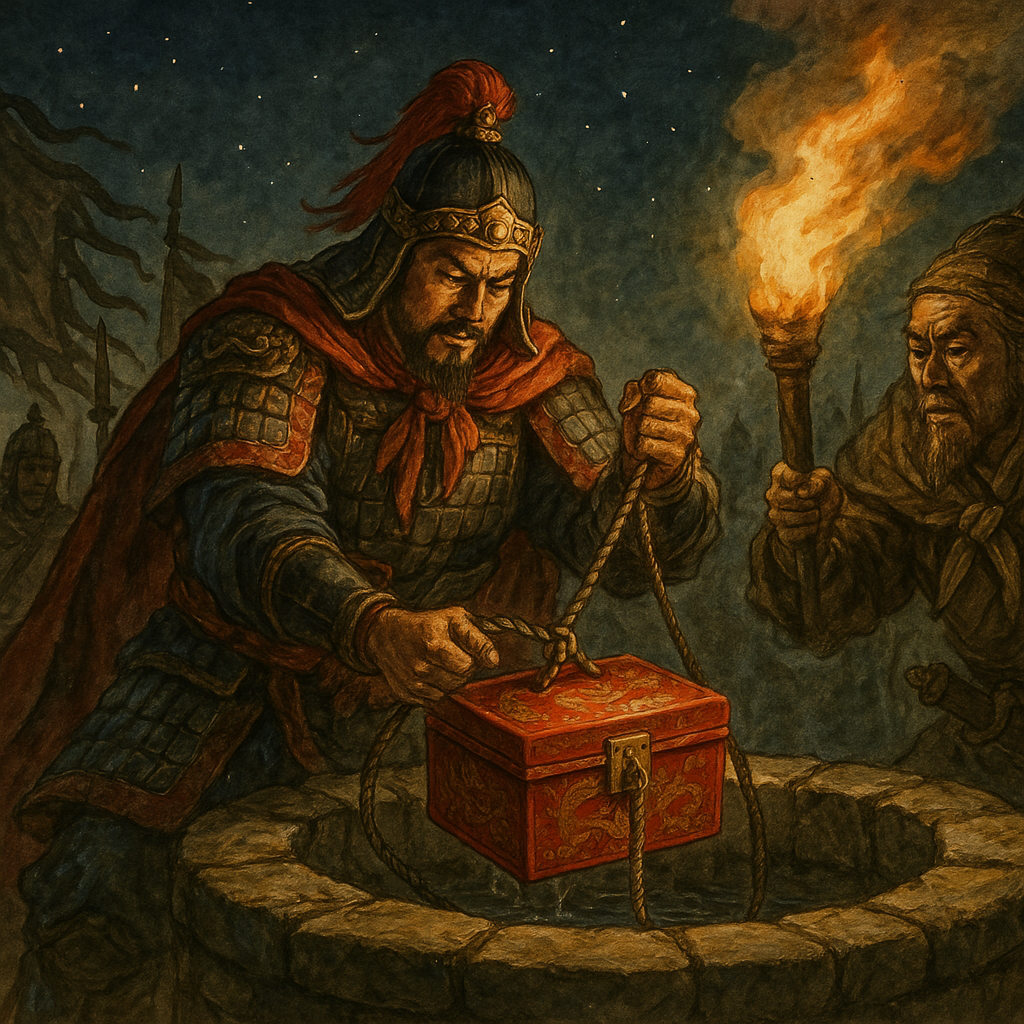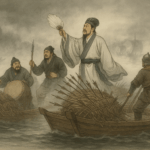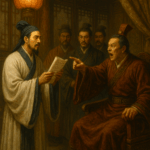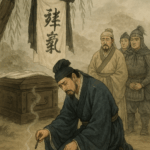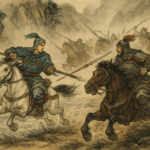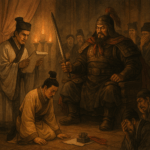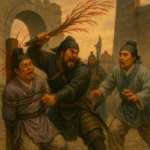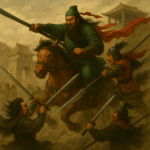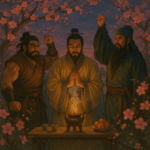As Zhang Fei thundered up to the gate, arrows and stones rained down, forcing him to withdraw. The eight allied lords sent word of their partial successes back to Yuan Shao’s camp, who in turn dispatched a summons to Sun Jian to press forward. Sun Jian hastened to meet Yuan Shu, bringing with him his lieutenants Cheng Pu and Huang Gai. Striking his staff on the ground, Sun Jian proclaimed, “Dong Zhuo and I have no personal quarrel. Yet here I risked death under a hail of missiles to fight his tyranny—for the realm and for my own honor—only to be denied supplies. How can I abide that?” Alarmed, Yuan Shu ordered the slanderers executed and begged Sun Jian’s pardon.
Soon a messenger arrived: “A general at the pass has come to see you.” Reluctantly Sun Jian rode back to his camp and learned it was Dong Zhuo’s favored officer Li Jue. “Why have you come?” asked Sun Jian. Li Jue replied, “Our Chancellor holds you in highest regard. He sends me to cement our bond: the Chancellor offers his daughter for your son.” Enraged, Sun Jian shouted, “Dong Zhuo is a traitor—he shall be annihilated, root and branch! How dare you propose marriage with his house? Begone, or I will spare you no mercy!” Fleeing for his life, Li Jue reported his rebuke to Dong Zhuo.
Furious, Dong Zhuo turned to his adviser Li Ru. “Sun Jian’s men treat us with contempt!” Li Ru counselled, “Lord, we have just suffered defeat; let us withdraw to Luoyang, move the Emperor to Chang’an, and fulfill the old omen: ‘One sovereign in the west, one in the east. When the deer enters Chang’an, calamity ends.’” Dong Zhuo brightened: “Your words open my eyes.” That very night he marched back to Luoyang to convene his court.
In the main hall he declared, “For two centuries the Eastern Capital Luoyang has thrived—but its fortune wanes. Chang’an is rich in auspicious qi; we shall escort the Emperor westward and make it our new seat. Prepare at once!” Tutor Yang Biao demurred, “The Guanzhong region lies desolate. Abandoning our ancestral temples and tombs will stir unrest among the common folk.” Dong Zhuo’s face darkened: “You block the realm’s great plan—are you a traitor?” He stripped Yang Biao, Grand Commandant Huang Wan, and Censor Xun Shuang of their posts, reducing them to commoner status on the spot.
As they departed, Prefect Zhou Bi and Colonel Wu Qiong bowed before Dong Zhuo at the palace gates to offer counsel against the move. He slew them both without hesitation, then issued orders to relocate the court by dawn. Li Ru advised, “Our coffers are empty. Let us confiscate the wealth of Luoyang’s great families—especially the clans of Yuan Shao and his allies—to fund the journey.” Dong Zhuo forthwith sent out five thousand cavalry to seize the city’s richest households, strap placards branding them “Traitorous Rebels,” and execute them beyond the walls, seizing their treasures.
With the streets emptied of two million souls, Li Jue and Guo Si led the forced migration eastward: every household escorted by soldiers, thousands perished on the march. Soldiers raped women, plundered food, and slew any who lagged behind under the watch of three thousand troops.
As Dong Zhuo’s column prepared to depart, he gave orders to burn the city: homes, ancestral temples, and palaces alike went up in flames. The two imperial palaces burned until their walls collapsed. At Changle Hall’s ruins, he had his men exhume the mausolea of former emperors and empresses, carting off their treasures. Soldiers ransacked every tomb, and under cover of smoke Dong Zhuo loaded thousands of wagons with gold, pearls, and silks, abducted the young Emperor and his consorts, and headed west toward Chang’an. Li Zhen, seeing the capital abandoned, surrendered the Sishui Pass to Sun Jian. Liu Bei, Guan Yu, and Zhang Fei stormed Hulao Pass as the allied lords converged on Luoyang.
Sun Jian Secures Luoyang and Finds the Imperial Seal
Sun Jian galloped into Luoyang, finding it ablaze—no living creature stirred for miles. He first extinguished the fires, then ordered the alliance’s armies to encamp on the city’s barren outskirts. Cao Cao pressed Yuan Shao, “Dong Zhuo’s flight west leaves him vulnerable—why not pursue?” Yuan Shao shook his head, “Our troops are exhausted; pressing on could invite disaster.”
Cao Cao retorted, “He has just ravaged the capital and abducted the Emperor—he knows not where to turn. Now is heaven’s mandate for a decisive strike. What do we fear?” The other lords offered no answer. In anger Cao Cao tore himself away with ten thousand men—among them Xiah Hou Dun, Xiah Hou Yuan, Cao Ren, Cao Hong, Li Dian, and Yue Jin—and rode south in hot pursuit.
Meanwhile, at the outskirts of Xingyang, Dong Zhuo’s envoy Xu Rong received him hospitably. Li Ru warned, “Chancellor, we have abandoned Luoyang—pursuers may be close. Let us ambush them at Xingyang: hide troops beside the hills so that when our enemies rush past, we may fall upon their rear.” Dong Zhuo consented and ordered Lü Bu to lead the rear guard.
At dawn Cao Cao’s vanguard caught up. Lü Bu laughed, “Just as Li Ru predicted!” He drew up his cavalry. Cao Cao charged, “Traitor! You burned the palace and kidnapped the Emperor—where do you flee?” Lü Bu sneered, “Proud fool, hold your tongue!” Xiah Hou Dun spurred forward; their lances clashed. Before either could prevail, Li Jue and Guo Si burst in from flanks. Cao Cao’s line shattered; he and his men fell back to regroup.
They reached a lonely hillside by the second watch, bivouacked, and prepared supper—when Xu Rong’s hidden force sprang up around them. In the chaos, Cao Cao spurred off alone down a path, only to be intercepted by Xu Rong’s arrow. Unhorsed, he struggled but was rescued by his cousin Cao Hong, who slew the attackers. As dawn broke, with only five hundred survivors, they limped back toward Henei. Dong Zhuo’s host pressed on toward Chang’an.
Sun Jian Provisions the Emperor
Back in Luoyang, each lord held his ground. Sun Jian extinguished the imperial palace’s dying fires, pitched his camp upon the ruins of Jianzhang Hall, and ordered the clearing of rubble. On the altars of the Grand Ancestral Temple he erected a humble pavilion of three chambers and invited the lords to worship the deceased Han emperors, offering a sacrifice of a great ox. After the rites, they dispersed. That night, beneath the stars, Sun Jian sat in the open, gazing at the constellations. He saw a pale mist drifting through the Purple Forbidden Enclosure and sighed, “The imperial star grows dim, the realm lies in ruin, the capital is laid waste, and the people starve.” Tears fell unbidden.
A soldier pointed at the well beside the pavilion: “Sir, see the five-colored glow rising from the water!” Borrowing torches, they hauled from its depths the body of a woman, miraculously preserved. She wore imperial court robes and a brocaded pouch at her throat. Within lay a small cinnabar box bound with gold. Inside it was a jade seal—four inches square, carved with five dragons in pursuit of a pearl, one corner patched with gold, bearing the legend:
“By Heaven’s Mandate, May He Reign Long and Prosper.”
Sun Jian asked Cheng Pu its meaning. Cheng Pu recounted the seal’s history: once unearthed from the Phoenix Stone beneath Mount Jing, presented to King Wen of Chu, later fashioned by Li Si for Qin Shi Huang; lost in Dongting Lake during a storm; found again on Mount Huayin; returned by a humble boatman to the First Emperor; then passed to Liu Bang, founder of Han. During Wang Mang’s usurpation, Empress Dowager Feng had a corner re-cut and inlaid with gold. Emperor Guangwu reclaimed it at Yiyang, and it passed through twelve emperors to the present. In the recent upheaval, the Ten Eunuchs abducted the young Emperor and lost the seal. “Now Heaven entrusts it to you,” Cheng Pu said; “with it, you may ascend to the Ninefold Throne. But you must ride east to your homeland and plot your destiny. Here you cannot linger.”
Sun Jian swore his secrecy before the star-filled sky.
Unknown to them, one of Yuan Shao’s men—a fellow clansman—had spied the seal and raced through the night to inform Yuan Shao. Yuan Shao rewarded him handsomely and kept him close. The next morning Sun Jian came to take his leave: “I suffer a lingering illness; I must return to Changsha.” Smiling, Yuan Shao replied, “I know your true ailment—the seal of empire weighs on you.” Sun Jian paled: “How dare you accuse me?” Yuan Shao said, “The seal from Jianzhang’s well—where is it?” Sun Jian swore by Heaven it was not his. “Then bring it forth now, or face the consequences!” Yuan Shao demanded.
Sun Jian clutched his sword, “I would rather die than betray this trust.” Yuan Shao drew his own blade, and behind him the commanders Yan Liang and Wen Chou also drew swords. Sun Jian’s lieutenants Cheng Pu, Huang Gai, and Han Dang brandished their weapons. All six poised to fight, until the other lords intervened. Without another word, Sun Jian spurred northward, abandoning the campaign. Yuan Shao fumed and sent a secret missive to Liu Biao in Jingzhou, bidding him intercept Sun Jian en route and seize the seal.
Cao Cao’s Second Pursuit to Xingyang
Meanwhile, Cao Cao returned from his rout at Xingyang, disheartened. Yuan Shao welcomed him with wine and lamentations. “When first I raised the banner of righteousness,” Cao Cao sighed, “my plan was for the lords to guard Mengjin and Suanzao, hold Chenggao and Aocang, and block Huan Yuan and Taigu passes—starving Dong Zhuo’s host without direct conflict. Meanwhile Sun Jian would fix him at Sishui, Gongsun Zan hold Hulao. With hazard deterred and allies astride his retreat, we could topple him. Yet now each lord sits idle, afraid to strike. Shall we entrust the realm to children?” None dared reply. Disillusioned, Cao Cao slipped away to Yangzhou.
Gongsun Zan turned to Liu Bei, Guan Yu, and Zhang Fei: “Yuan Shao is useless—he will betray us. We must depart.” So they withdrew north to Pingyuan. There Liu Bei was appointed Magistrate, his brothers left to train the troops. In Yanzhou, Prefect Qiao Mao refused to supply Inspector Liu Dai with provisions. Liu Dai stormed the camp, slew Qiao Mao, and absorbed his soldiers.
Yuan Shao, seeing the alliance fragment, pulled up camp and returned east of Luoyang to his own territories.
Jingzhou’s Interception of Sun Jian
In Jingzhou, Governor Liu Biao—courtesy name Jingsheng—was a scion of the imperial line, known for patronizing literary talents as one of “the Eight Worthies of Jiangxia.” When he received Yuan Shao’s letter, he dispatched officers Kuai Yue and Cai Mao with a thousand men to waylay Sun Jian. Sun Jian’s camp was caught by surprise. “Why bar my passage?” he demanded. Kuai Yue sneered, “You who claim loyalty to the Han hide the imperial seal—surrender it at once!” Enraged, Sun Jian ordered Huang Gai forth. In the clash, Huang Gai’s iron whip shattered Cai Mao’s cuirass—and Liu Biao himself rode up at the head of his army.
Sun Jian saluted, “Why do you heed Yuan Shao’s summons against me?” Liu Biao accused him of usurping the seal. Sun Jian swore again by his life that he bore no such treasure. Liu Biao offered to search his baggage, but Sun Jian growled, “Fool, do you think me so feeble?” Raising their lances, they prepared to battle—when both retreated in deference to the protestations of mutual friends.
The Imperial Seal’s Fate and the Rift of Allies
Thus the imperial seal, meant once more to determine a ruler’s mandate, fell into uncertain hands, drawing sword and betrayal across the land. Sun Jian pressed on toward Changsha, determined to secure his future course. Liu Bei, with his brothers, returned to train the troops at Pingyuan under Gongsun Zan’s diminished banner. Yuan Shao, his alliance unraveled, returned to his own holdings.
And so the realm remained fractured—its destiny bound to a tiny jade seal, hidden yet potent, as the warlords jockeyed toward the final reckoning.
